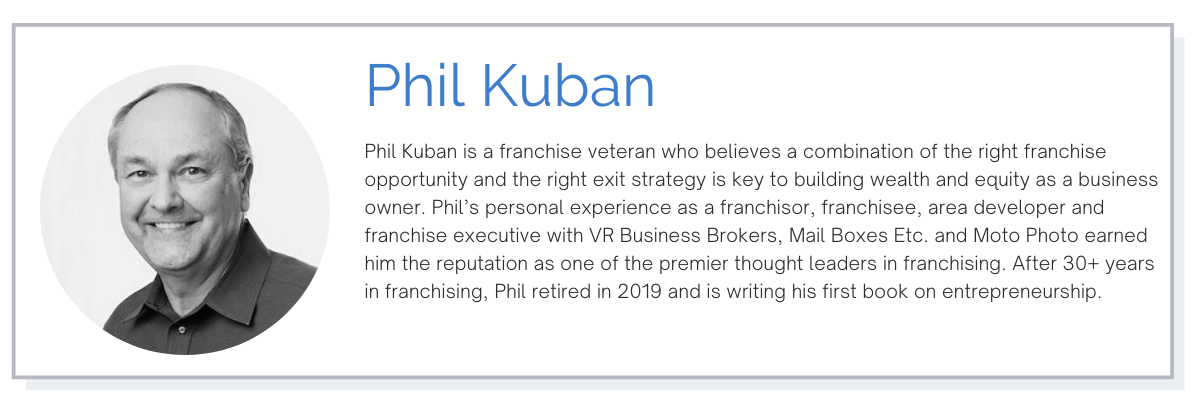Not every business owner is motivated by a “dominate the business world or die trying” mentality. For most corporate refugees (as I once was), business ownership is about creating your own path – one that offers you a chance to control your destiny, be the boss, take over as much of the world as you choose and create the balance you want in your life. Still there is much to be learned from the empire builders, those who make up about 20% of all franchise owners, but control a much larger piece of the pie.
These five franchise growth strategies are not rocket science and don’t require you to learn a whole new industry from scratch. These are common-sense ideas gleaned directly from successful FranNet clients. One such power-franchisee is Ralph Martin, owner of ERS-Electronic Restoration Services of Georgia and FranNet of Atlanta client. Never heard of him or his company? You will.
I’ve told Ralph’s story before. Motivated by the need to be home to care for his family and a desire never to return to corporate America, he decided to try his hand at a franchise. After several successful pure entrepreneurial adventures funded by venture capital, he used his own resources to purchase rights to the entire state of Georgia for ERS.
“We built a multi-million-dollar business out of literally nothing.”
Ralph quickly outgrew his original space and just moved to a new state-of-the-art 1200 square foot facility in Peachtree Corners, a suburb just north of Atlanta. He also recently purchased Art Recovery Technologies (ART), a new franchise from his franchisor as a bolt on to his existing business.
1. Find the “Blueish” Ocean
In 2005, Chan Kim and Renée Mauborgne introduced Blue Ocean strategy, which BusinessDictionary.com refers to as, “the opportunities of vast, untapped market spaces, or “Blue Oceans,” that can be developed by expanding market boundaries or launching new industries. Blue ocean does exist in the franchise world, you just need the right strategy to find it.
In Ralph’s case, the disaster recovery market was over saturated. Not so in electronics restoration. The only competition was a few Mom and Pop shops. Ralph was in the first wave of franchisees and, “it felt like being on an island surrounded by blue water.” Neighboring states had undeveloped territories as well and the franchisor was hungry to get markets.
2. Reinvest in Your Business
Ralph was not focused as much on building an income for himself and while his children worked for him at various times, his strategy was growth – to reinvest as much as possible back into the business. This gave him the opportunity to scale to a national level like nobody’s business.
3. Hire Talent to Work IN the Business While You Work ON the Business
When you’re the business owner, you have to get to know every aspect of it, especially at first. Eventually you’ll want to hire, motivate and cultivate talent. Ralph has hired his technical experts from every branch of the U.S. military because, “they have skills you can’t learn in the private sector.”
Cross training is also vital for small business owners. ERS employees are not limited to just one activity. Technicians are also warehouse guys and do deliveries. Sales guys start off with deliveries and work the warehouse to learn every step of the process so they can sell it with confidence.
“The day I fix a computer is the day my business dies.” Ralph knows his strength is business development, so he trusts his team on the operational side.
4. Utilize Your Network
Your network can provide more than just referrals. Friends and former colleagues can help you in ways you might not think of. For example, with newer franchise brands, the data you desire may not yet exist. Ralph didn’t know a thing about disaster recovery or electronics, but he believed in his relationships and reached out to his network for answers. “You’re only 2-3 degrees of separation from contacts who can make an introduction that helps answer your questions.”
“I had no data to forecast revenue because the franchise was literally brand new.” So, he picked up the phone and was able to cobble together through his network enough data on the insurance industry to create a forecast that turned out to be very accurate.
5. Nurture Your Entrepreneurial Spirit
Don’t think that because you’re buying into a franchise system, your “back of the envelop ideas should go in file 13.” Some of the most creative strategies for capturing market share have come from the doodled graphics of early franchise adopters.
Ralph knows enough about art to get through a cocktail party; but he also knows through experience the value it has for people, so he recently pioneered a whole new line of business. “It works because the process is the same whether you’re restoring a computer, your sports memorabilia collection or Grandmother’s wedding portrait.” We’ve opened a whole new revenue stream at a minimal additional expense.
Growth strategies can vary as much as the almost 4000 franchise brands on the market today. Some entrepreneurs want to grow at a snail’s pace, taking a regular income from the business and carving out career paths for others over the long term. Some opt for measured growth, earning a modest income while building equity in a business they can one day sell for a profit or pass down to family. Still others look to a semi passive strategy to simply help diversify their portfolio of investments. Whatever your motivations, I can guide you through a thoughtful process of identifying franchise opportunities that fit you best.
Click here to schedule a time to discuss your empire building strategy.


